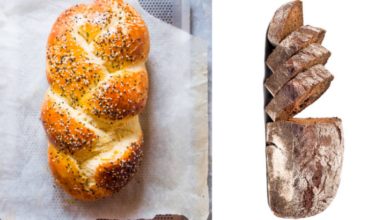Why Is My Challah Bread Dry? Here’s The Surprising Answer!
What To Know
- If the dough is not proofed for long enough, the yeast will not have time to produce gases, resulting in a dense and dry loaf.
- Allow the dough to rise in a warm, humid place for at least 1 hour, or until it has doubled in size.
- Try using bread flour or a blend of all-purpose and bread flour for a more flavorful and chewy loaf.
Challah bread, with its golden crust and soft, fluffy interior, is a beloved delicacy. However, if your challah turns out dry, it can be a frustrating experience. This blog post will delve into the potential reasons behind dry challah bread and provide comprehensive solutions to help you achieve the perfect loaf every time.
Understanding the Science Behind Bread Moisture
Bread moisture is primarily determined by the balance between water and other ingredients, such as flour and gluten. During the kneading process, water forms bonds with the proteins in flour, creating gluten strands that give bread its structure. However, if there is insufficient water, the gluten network becomes too tight, resulting in a dry and dense loaf.
Common Causes of Dry Challah Bread
1. Insufficient Water:
The most common cause of dry challah is simply not adding enough water. Always follow the recipe measurements carefully and adjust the water content as needed based on the flour you are using.
2. Over-Kneading:
Excessive kneading can develop the gluten network too much, making the bread tough and dry. Knead only until the dough comes together and forms a ball.
3. Inadequate Proofing:
Proofing allows the dough to rise and develop flavor. If the dough is not proofed for long enough, the yeast will not have time to produce gases, resulting in a dense and dry loaf.
4. Incorrect Oven Temperature:
Baking challah at too high a temperature can cause the outside to brown too quickly, while the inside remains undercooked and dry. Always preheat your oven to the correct temperature and adjust the baking time accordingly.
5. Lack of Eggs or Oil:
Eggs and oil add moisture and richness to challah. If your recipe does not include these ingredients, consider adding them for a softer texture.
6. Using Old Flour:
Old flour can lose its ability to absorb water, leading to a dry loaf. Always use fresh flour for optimal results.
7. Incorrect Water Temperature:
Cold water can slow down the yeast’s activation. Use warm water (around 105-115°F) to promote yeast growth and a moist loaf.
Tips for Moist and Flavorful Challah Bread
1. Use a Kitchen Scale:
Measuring ingredients by weight rather than volume ensures accuracy and consistent results.
2. Proof the Dough Properly:
Allow the dough to rise in a warm, humid place for at least 1 hour, or until it has doubled in size.
3. Bake at the Right Temperature:
Preheat your oven to 350°F and bake for 25-30 minutes, or until the crust is golden brown and the internal temperature reaches 190°F.
4. Add Eggs or Oil:
Include eggs or oil in your recipe to enhance moisture and flavor.
5. Use Fresh Ingredients:
Always use fresh flour and yeast for optimal bread quality.
6. Experiment with Different Flours:
Try using bread flour or a blend of all-purpose and bread flour for a more flavorful and chewy loaf.
Troubleshooting Dry Challah Bread
If your challah bread still turns out dry, try the following troubleshooting tips:
1. Increase Water Content:
Gradually add more water to the dough until it becomes soft and pliable.
2. Reduce Kneading Time:
Knead the dough for a shorter duration to avoid over-developing the gluten.
3. Extend Proofing Time:
Allow the dough to proof for longer to give the yeast more time to work.
4. Adjust Oven Temperature:
Lower the oven temperature by 25°F and extend the baking time to prevent the outside from browning too quickly.
5. Add Eggs or Oil:
If your recipe does not include eggs or oil, add them to the dough for extra moisture.
FAQs
Q: Why is my challah bread dense and crumbly?
A: This can be caused by over-kneading, insufficient proofing, or using too much flour.
Q: How can I make my challah bread more flavorful?
A: Try adding spices, herbs, or a mixture of different flours to enhance the taste.
Q: Can I freeze challah bread?
A: Yes, challah bread can be frozen for up to 3 months. Allow it to thaw completely before serving.
Q: How do I prevent my challah bread from burning on the bottom?
A: Place a baking sheet on the rack below the challah to prevent direct heat from burning the bottom.
Q: What is the best way to store challah bread?
A: Store challah bread in an airtight container at room temperature for up to 3 days.
By understanding the science behind bread moisture and following these tips and troubleshooting suggestions, you can consistently create moist and flavorful challah bread that will impress your taste buds and delight your loved ones.
